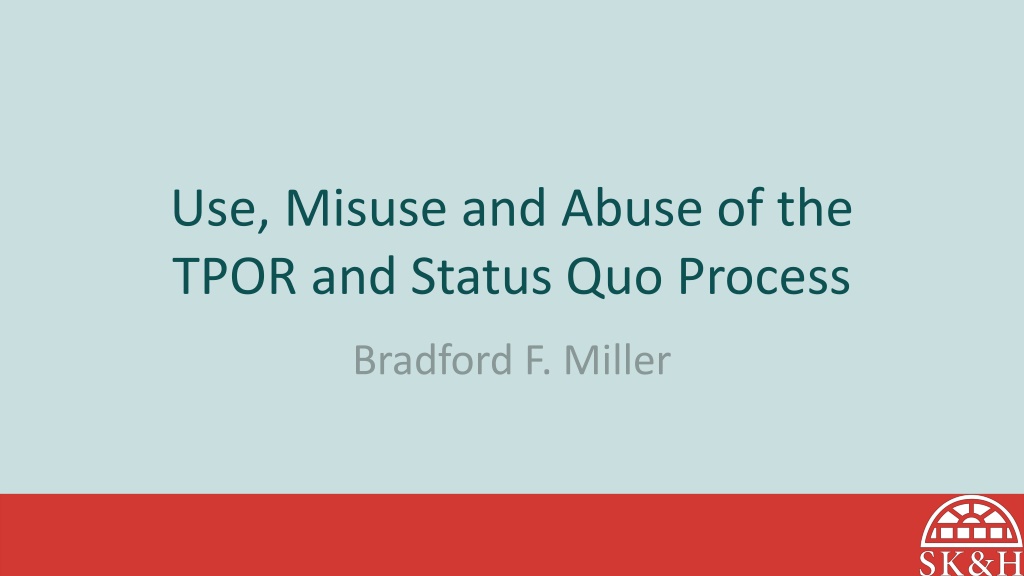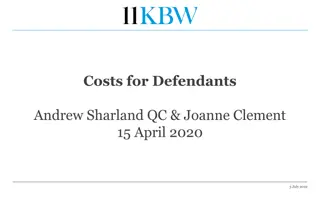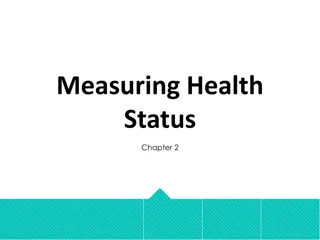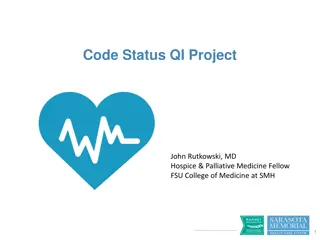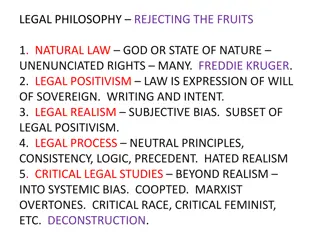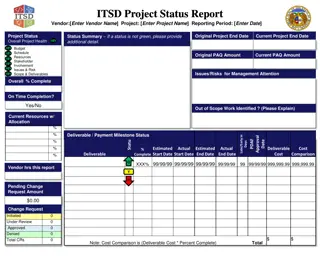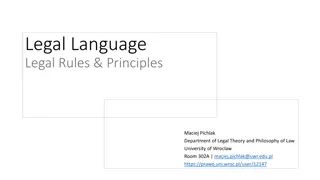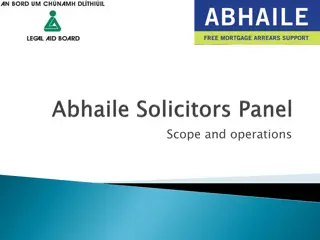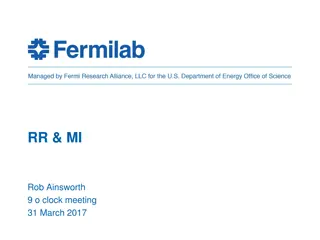Understanding TPOR and Status Quo Process in Legal Procedures
Explore the nuances of TPOR (Temporary Protective Order of Restraint) and the Status Quo Process through definitions, procedures for obtaining relief, and what to include in motions, affidavits, and orders. Learn about emergency relief exceptions, third-party rights, and the legalities surrounding filing for TPOR before and after judgment in family law cases.
Download Presentation

Please find below an Image/Link to download the presentation.
The content on the website is provided AS IS for your information and personal use only. It may not be sold, licensed, or shared on other websites without obtaining consent from the author. Download presentation by click this link. If you encounter any issues during the download, it is possible that the publisher has removed the file from their server.
E N D
Presentation Transcript
Use, Misuse and Abuse of the TPOR and Status Quo Process Bradford F. Miller
Definition of Terms Status Quo Order Post-Judgment (ORS 107.138) TPOR Pre-Judgment (ORS 107.097)
What were not Covering Emergency Relief (Sub (3)); ORS 107.139 Interplay with Chapter 109 Unmarried parents Third party rights re: this relief
TPOR - How do you Obtain Relief? Motion Affidavit Declaration? Order
TPOR - Motion What must be included? Not much! Request Which relief are you requesting? Points and authorities Children affected Name it correctly!
TPOR - Affidavit What Must be included? ORS 109.767 Details What Should be included? Who you are and what you want Which relief you are requesting Support for the relief you are requesting
TPOR - Order What must be included The relief ordered ORS 107.097(2)(c) Notice What should be included? Names of the children affected What should NOT be included Anything not authorized by statute!
TPOR After Signing Order and Affidavit MUST be served pursuant to ORCP 7 (2)(c) Relief is not immediate. Presumably the motion as well?
TPOR Order: Relief Available (b) - Upon receipt of an application under this subsection the court may issue a temporary protective order of restraint restraining and enjoying each party from EACH ? Both The two considered together the one as well as the other Each The individual members of a group considered separately All? Every? Either?
TPOR - Order What it IS An order of restraint What it is NOT A custody order A parenting time order Distinguish from ORS 107.097(3)(a), A court may enter ex parte a temporary order providing for the custody of or parenting time with, a child if
TPOR Order: RELIEF (A) Changing the Usual Place of Residence Defined in 107.138 The place where the child is living at the time the motion for the temporary order is filed and has lived continuously for a period of three consecutive months, Excluding any periods of time during which the non- custodial parent did exercise or would otherwise have exercised parenting time Not the Place of Present Physical Location
TPOR Order: RELIEF (B) Interfering with the present placement and daily schedule of the child Defined in ORS 107.138 The contact, parenting time, placement, schedule and routine at the time the motion for the temporary order is filed.
TPOR Order: RELIEF (D) Interfering with the other party s usual contact and parenting time with the child (F) In any manner disturbing the current schedule and daily routine of the child until custody or parenting time has been determined Both also Defined in ORS 107.138 The contact, parenting time, placement, schedule and routine at the time the motion for the temporary order is filed.
TPOR Order: RELIEF So are (B), (D), and (F) identical? Strictly, yes, they each have the same definition If plain language, maybe different, but defined (F) contains the only difference: Interfering with versus In any manner disturbing
TPOR Order: RELIEF (C) Hiding or secreting the child from the other party Plain language; no definition (E) Leaving the state with the child without written permission of the other party or permission of the court How do you get permission? Affidavit? Motion? Order? The Court may be authorized by statute to approve exceptions, if spelled out in the motion/affidavit; but then they must be included in the order
TPOR Order: Relief (A) (F) (E) permission of the court; or It s your motion, ask for what you want Nothing precludes the other side from filing a motion requesting this relief
TPOR - Response Who can make? A party against whom an order is entered under subsection (2) Further confirmation this is an order of restraint (on a party) rather than an order of custody and parenting time When? At any time while the order is in effect
TPOR - Response What is the document? State Court administrator proscribes the content and form Notice in the Order says you must tell the court and the other party that you object to the order and specifically why you disagree with the representation of the status quo described in the order Who was required to make a representation about the status quo in the motion or affidavit?
TPOR - Hearing When Reasonable Efforts to hold within 14 days and shall hold a hearing no later than 21 days after receipt of the request of the hearing TPOR remains in place through the date of the hearing. (4)(c) and continues or is vacated if someone fails to appear
TPOR Hearing ISSUE: Limited to a determination of the status quo at the time the order was issued. What is the status quo? Not defined in ORS 107.097 or 107.138 Is it the aggregate of the contents in the affidavit?
TPOR Hearing: What is Status Quo? ORS 107.138 When you get a temporary status quo order you must have an affidavit: Setting forth with specificity the information required by ORS 109.767 Contrast with 107.097 ( conforming to the requirements of ORS 109.767 ) And the person with whom the child has lived during the preceding year And the child s current schedule, daily routine and usual place of residence We know this means the contact, parenting time, placement, schedule and routine at the time the motion for the temporary order is filed ; and the place where the child is living at the time the motion is filed and has lived continuously for a period of three consecutive months Is this, in aggregate, the status quo ?
TPOR Hearing: Issue If the issue is determining the status quo at the time of the motion, what does that make the hearing about? What is the prima facie case you must prove? Does the Court continue to only make orders of restraint akin to the additional application?
TPOR Hearing: LOOPHOLE (4)(d)(A) If the child s usual place of residence cannot be determined, the court may make any further order the court finds appropriate in the best interest of the child. Does this contravene the prefatory paragraph? ( a court may not enter ex parte a temporary order providing for the custody of or parenting time with, a child ) You ve now had a hearing albeit on a limited issue .
TPOR Hearing: Further Order ANY ? Custody order? Parenting time Order? Exclusive use? Drug testing? Supervision? Contact restrictions? Suit money? Child support?
TPOR Hearing: Further Order How is this record created? Both parties are limited to the sole issue of the status quo How does a party present best interest evidence to the Court with this limitation?
TPOR Hearing: Further Order Is this good practice? Expedited hearing (14-21 days), then authorizing relief that is otherwise reserved until after discovery ORCP 43 doesn t permit a Request for Production until 45 days after service Reasonable Notice for depositions May not be enough time to send subpoenas, obtain mental health or school records; substance abuse issues; domestic violence? Mediation? Parenting Education class?
TPOR - Hearing: Further Order How do you prove a best interest case in 14 days Does this create issue preclusion for further pendente lite relief?
TPOR Ethical Issues Ex Parte Relief What happened to notice? Not Contested Relief ? Relevant SLRs
TPOR Ethical Issues Contrast with Zealous Advocacy?
Status Quo How do you Obtain Relief When? In a proceeding to modify a judgment that awards custody of a child (1)(a) What is required prior to entry of the order? Notification of the other party (1)(a)(A) Opportunity to Contest (1)(a)(B)
Status Quo - How do you Obtain Relief Motion Affidavit Order
Status Quo - Affidavit Must include: With specificity the information required by ORS 109.767 ; and The person with whom the child has lived during the preceding year; and The child s current schedule, daily routine and usual place of residence Defined in 107.138(3)(a) and (b)
Status Quo - Notice To whom The party against whom the motion for the order is sought When At least 21 days before the date set for the hearing How is notice given Service
Status Quo Differences from TPOR No Best Interests latitude No application prior to hearing
